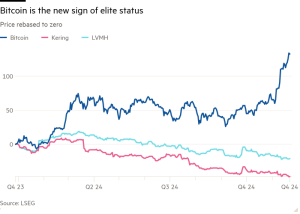Rising Middle East violence piles pressure on Kamala Harris
Unlock the US Election Countdown newsletter for free
The stories that matter on money and politics in the race for the White House
Kamala Harris’s hopes of limiting the political fallout from the conflict in the Middle East have been dashed by escalating tensions between Israel and Lebanon and the rising danger of all-out war in the region.
On the US presidential campaign trail, Harris has vowed to keep pursuing a ceasefire deal in the year-long war in Gaza that could pave the way for a return to stability across the Middle East.
But with little more than a month to go before the November election, the reality on the ground has moved in the opposite direction: the US has failed to broker a truce in Gaza while Israel has intensified its operations against Hizbollah, the Iranian proxy group that has been launching missiles from Lebanon into northern Israel for months.
On Friday, Israeli forces took their assault on Hizbollah to a new level with massive strikes on Beirut, the Lebanese capital, killing Hassan Nasrallah, the group’s leader. This has further increased the prospect of a widening conflict that the Biden administration has been trying to avoid.
Harris at the weekend issued a statement reiterating that the White House did not “want to see conflict in the Middle East escalate into a broader regional war” and “diplomacy remains the best path forward to protect civilians and achieve lasting stability in the region”.
US officials insist that the strike on Nasrallah had not been co-ordinated with Washington. “I can tell you the United States had no knowledge of or participation in the [Israel Defense Forces] action,” President Joe Biden said on Friday.
The risk for Harris is that her repeated calls for an easing of tensions in the Middle East will ring hollow as Israel’s government led by Prime Minister Benjamin Netanyahu continues to reject de-escalation and presses ahead with its offensives.
To critics, it is a sign that the Biden administration has been unable or unwilling to exercise its leverage over Netanyahu, a dynamic that has dogged Washington’s response to the conflict since Hamas’s October 7 attack on Israel last year.
The surging hostilities in Lebanon are a particular blow to Harris because they will make it harder for her to patch up relations with parts of the Democratic coalition — including Arab Americans and young voters — who have been especially critical of the administration’s handling of the war in Gaza and are threatening to stay out of the election. Even just a few thousand defections could make a difference in key battleground states such as Michigan, Pennsylvania and Wisconsin.
“In a close race, every little audience matters,” said Mary Anne Marsh, a Democratic strategist. While Middle East policy is not a broad-based issue like the economy or abortion, she said it was “important to certain groups of voters” such as Jewish and Arab-American people. “Those audiences will be paying attention to all this,” she said.
Many Republicans are criticising Harris from a different perspective, arguing that the administration has failed to deter Iran and its proxies from attacking Israel and has been too hesitant in its support for Israel.
They say Trump would be better positioned to calm the region as part of a broader pitch that Biden and Harris have blundered on foreign policy and struggled to rein in US adversaries under their watch.
“The Biden administration is paralysed by fear of Iran. In the name of not escalating, the world is on fire. So I promise you, if Trump does win, we’re going to fix this pretty quick”, Lindsey Graham, the Republican senator from South Carolina, told CNN on Sunday.
Tom Cotton, the Republican senator from Arkansas, told CBS that rather than calling for de-escalation, the US “should help Israel drive Hizbollah to the mat and choke it out and finish it off once and for all” so that “Iran would be exposed on its flanks with no terror proxy capable of devastating Israel”.
Democrats insist that Harris would be a far more stable leader on the international stage than Trump, pointing to her recent endorsements from former military and diplomatic officials who have served under administrations of both parties.
But the developments in the Middle East are causing increasing alarm in Washington. US officials said they were prepared for a response to the attacks from Iran, noting that the country had shifted more resources to the region, though it was too soon to tell what Tehran might do.
In a separate announcement, the US military said it had launched two strikes in Syria, killing 37 people including senior members of al-Qaeda and Isis.
“I would urge both sides, Israel and Hizbollah, to take a look at the far ridge line,” Stanley McChrystal, the retired army general who led US forces in Afghanistan and Iraq and has backed Harris for president, told CBS, referring to the need for them to take a longer-range view. “Just spiralling the violence is unlikely to produce a good outcome.”
#Rising #Middle #East #violence #piles #pressure #Kamala #Harris




